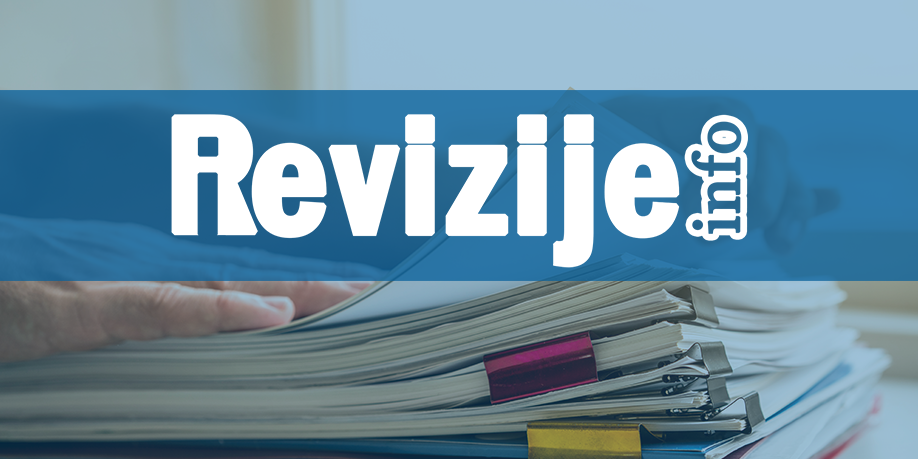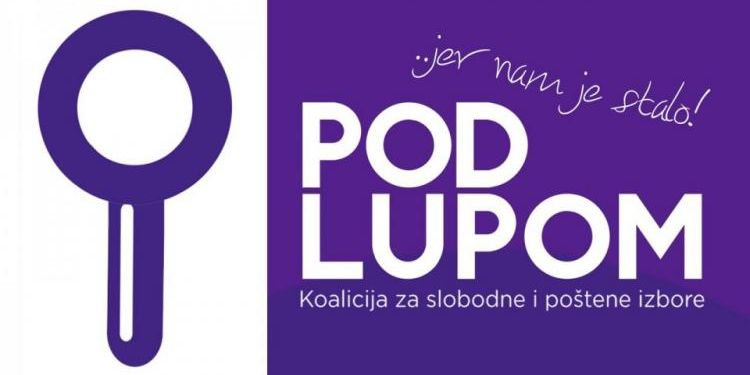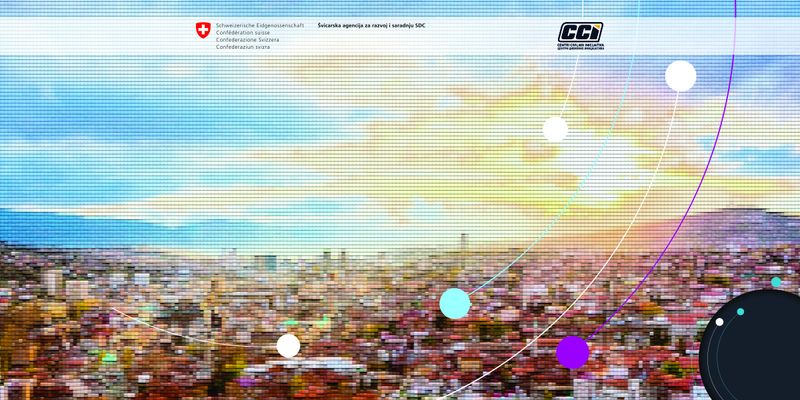
Time period between the two election cycles in BiH, 2014 – 2018, was followed by constant monitoring of work of BiH executive and legislative authorities – i.e. all parliaments and governments at the levels of cantons, entities and the state level. More than 150 reports were published.
The mandate period 2014 – 2018 at the state level was burdened by the systemic problem, which makes it almost impossible to establish programmatic coalitions in political surroundings with poor civilizational and democratic levels, repeatedly produces poor results. The so-called “partnerships” or “mathematical coalitions” and division of power (in the literal sense), that imply establishment of party control over certain sectors and segments of life, rather than joining the efforts on the basis of common goals and interests of citizens, have ruined every possibility to improve the living in this country. And they sentence us to the continuing instability and the state of being a hostage in political games of local powerlords, whose only goal is to remain in power and to protect their acquired “privileges” (including the enormous wealth often obtained through illegal activity – as testified by the latest sanctions imposed by the US administration). The government at the state level is in a strange situation. Its most significant successes are mainly the result of understanding and assistance from “outside”, while its greatest failures are the consequence of the politics from within the country – the one that was mentioned by the High Representative in one of the UN’s annual reports discussing the tendencies “shown by certain political actors who return to destructive plans from the past that lead to further divisions”.
The mandate period 2014-2018 in Republika Srpska passed in the atmosphere of political instability and constant bickering between the authorities and the opposition that emanated from a disputable way in which the authorities were formed at the beginning of the mandate – in something that was never fully clarified by the relevant authorities, the case of potential political corruption (known as the “Dva papka Affaire”). During the current mandate only the ways of manifestation of the conflict between two rather monolithic political blocks in RS varied, i.e. from verbal insults (often inappropriate for the public space and degrading for the RS institutions), through the boycott of the work of the National Assembly, organizing mass rallies, demands for extraordinary elections, to the threats of complete abandoning of the Assembly by the opposition and a transition toward the out-parliamentary struggle against the “regime”… The opposition has questioned the legitimacy of the current power itself, accusing it of severe crime, abuse of power and economic destruction of Republika Srpska; on the other hand the authorities accused the opposition of betrayal of national interests.
The mandate period 2014-2018 was marked in BiH Federation by almost constant political instability caused by the problems in relationships within the ruling coalition. Factually, only the actors of the conflict alternated, with their scandals that upset the public, who showed the worst face of politics and agreed only in one – staying in power, no matter what. The authorities showed a chronic lack of the capacities (and the will) to create a functional system, to ensure the political stability, as a basis of economic progress, and to start addressing serious problems faced by the citizens and the society as a whole. Furthermore, instead of accepting responsibility for the results of the authorities that they make a part of, as the election approaches, the members of the ruling coalition are trying hard to make as big distance as possible between themselves and pass on the responsibility for bad performance of the government to the coalition partners, thus relativizing the division to the government and the opposition before the election and improve their rating. While keeping all the benefits that they enjoy based on their position as the authorities.
These are the activities within CSSP project, funded by USAID.
You can download the summary reports from the following links.
Monitoring
performance of the Council of Ministers and the Parliamentary Assembly
of Bosnia and Herzegovina during the October 12, 2014- June 30, 2018
term of office.
Monitoring performance of the FBiH Government and the Parliament during the 2014-2018 term of office.
Summary
of the Report on monitoring performance of the Government and the
National Assembly of Republika Srpska during the term of office October
12, 2014 – June 30, 2018.


The First Preliminary Report on Long-Term Observation of 2018 General Elections of the Pod lupom Coalition presented. The following electoral irregularities have been noticed in the campaign so far:
In 364 cases the political subjects started an early political campaign. The central electoral roll still remains one of the biggest problems in the country because, among other things, in 10 municipalities a doubt was expressed that the electoral roll was not up-to-date; a suspicion has to do with the existence of a certain number of deceased persons in the electoral roll. Coalition observers reported about unofficial information and allegations on trade of the seats on the electoral board in 14 municipalities/cities. There was also one case of possible abuse of personal data aimed at delivery of false reports for voting by mail. Additional, pressures were recorded on BiH citizens living abroad where mass campaigns were conducted for voting via mail.
Major occurrence of false profiles on social networks (primarily on Facebook) is also worrying: they organize fake prize games, and this was noticed already in May and June. A condition for participation in prize games or for winning a prize is for a citizen to provide their personal data i.e. photographs from both sides of ID cards.
9 cases of illegal pressures on voters or buying of votes were recorded. 4 cases relate to SNSD, 2 on SDS and one to DNS, SPA and SP each.
A total 31 cases of abuse of public funds, i.e. citizens’ money was recorded for the purpose of the campaign of certain political subjects. Of total number, 20 cases relate to the abuse of public budgets, public campaigns or public office, while 11 cases relate to intensifying public works throughout BiH cities and municipalities.
The report contains the findings from 63 long-term observers in the field gathered during the period from 23 July to 02 September 2018. The entire report is available from http://podlupom.org/v2/bs/dokument/opci-izbori-2018-prvi-preliminarni-izvjestaj-o-dugorocnom-posmatranju-izbora-2018/243
The work of the Coalition “Pod lupom” is implemented within the project BASE – Building Accountability and System in Elections, supported by the Delegation of the European Union in BiH and USAID.

„Mapping Illegal Dumping in BiH Federation – a Contribution to Soil Remediation“ is a name of the new project implemented by CCI.
This project aims at making a contribution to efficient management, repair and soil remediation through establishment of the register of illegal (fly) dumping in BiH Federation.
Most local self-governances in BiH have no data on the location and contents of wild dumping; the data of the municipalities/cities that collected them as part of their previous activities and relating to closing city landfills were not updated and should go through a verification phase. This was a reason why a questionnaire was sent out to the addresses of all local self-governances in the territory of BiH Federation in which we requested the information about the existing fly dumping sites.
A „green alarm“ was introduced, a free toll number ( 080 05 05 06) that the citizens of BiH Federation can call to report the location and other data on illegal dumping sites, thus contributing to a cleaner and healthier environment. The spot is available from the link. https://www.facebook.com/Centri-civilnih-inicijativa-CCI-143699145672946/
Project „Mapping Illegal Dumping in BiH Federation – a Contribution to Soil Remediation“ is implemented during the period 01 June 2018 – 31 May 2019 and is supported by BiH Environment Protection Fund.


CCI was organizer of the Conference „Audit of Public Institutions in BiH – Unused Potential“, which was organized in order to have a snapshot of the situation in the implementation of the recommendations and analysis prepared by CCI in 2016.
Just to remind, two years ago the Centres for Civic Initiatives (CCI) developed the Analysis „Audit of Public Institutions in BiH – Unused Potential“ which incorporated the suggestions, comments and proposals of the representatives of audit institutions, relevant parliamentary/Assembly commission, ministries, NGOs and other stakeholders, received after a thematic Round Table held on 27 October 2016, in which the Analysis was presented. This event was also an opportunity to identify the difficulties and the problems in the processes of audit of public institutions in BiH. The conference participants took the opportunity and presented their views of the possibilities to improve the existing practices in terms of assuming the roles and actions by all the responsible and relevant actors in the process of implementation of audit at all levels of authorities in BiH.
One of the conclusions from this Conference was that gathering the key actors, representatives of top audit institutions in BiH, representatives of parliamentary/Assembly Commissions for finances, budget and audit, of finance ministries, representatives of relevant prosecutor's offices responsible to act upon the findings from audit reports, representatives of the media and of non-governmental organizations and international institutions in BiH, both in this conference and in similar events, was a good way to contribute, through an open dialogue of all key actors, to better understanding and toward taking necessary steps and necessary synergy action by all relevant subjects for strengthening the position of audit and defining further action and efficient activity in the direction of implementation of key recommendations.



How to plan the agricultural production in the Bijeljina region more efficiently, is a topic that the CCI together with its partners in the Semberija area is intensively engaged in.
The preparation of the document “Analysis and Development of the Model for Collecting the Information about Planning the Agricultural Production in the Bijeljina area” is in final stage. To the end of more extensive communication with interested citizens and experts, the document entitled “Proposed Measures for More Efficient Planning of Agricultural Production in the Bijeljina Area” was prepared, as an excerpt from the analysis. The above documents can certainly assist the farmers and processors, as well as the relevant representatives of local authorities in Bijeljina, to better understand the advantages of timely planning the agricultural production, using the analysis to emphasize the problems that are currently stalling this process and to offer useful solutions.
The preparation of the analysis was preceded by organization of a panel discussion on the existing practices in the development of agriculture and the proposals of the model of collecting information about planning the agricultural production in the Bijeljina area. This event, held on 07 August 2017 in Bijeljina, gathered the representatives of the ministries of agriculture, water management and forestry of the RS, local authorities, as well as the processors and farmers. Low incentives, protection of certain cultures through higher incentives, fragmenting the farms in Bijeljina, the young people leaving the villages, the lack of transparency during distribution of the assistance for farmers by local authorities, low purchase prices given by the local processors – all these were the topics discussed in the panel discussion and that were addressed in the mentioned analysis.
At the same time, the second half of August, as well as September, are the time periods when the beneficiaries of the project “Strengthening the Integral Agricultural Production for Reduction of Unemployment and Substitution of Import in Processing Industry” collect the fruits of their work and efforts they made over the months. That is to say, this is the time of picking the paprika. As planned in the project, the beneficiaries (farmers) deliver the red paprika that they collected to CCI partner on the mentioned project, Company Sava Semberija. As of 15 September, our beneficiaries have delivered over 100 tons of paprika Cartur hybrid of F1 generation to Sava Semberija.
After the process of harvest and sale/purchase is complete, the project beneficiaries will re-register their non-commercial farms into commercial and thus acquire both new rights and obligations – in this way they will be deregistered from the list of the unemployed of the Employment Bureau, that is to say, the project beneficiaries, as the owners of commercial farms automatically become employed persons.
In addition to CCI, as a leading implementer, other entities that participate in the project as partners include the City of Bijeljina, RS Employment Bureau – Bijeljina branch, ‘Sava Semberija’ and Adult Education Institution ‘Dositej’. The goal of the project is to decrease unemployment in the territory of Bijeljina, i.e. increase competitiveness of local farmers and processors of red paprika, which is a part of the wider program „Support to Local Partnerships for Employment in BiH“, financed by the European Union and implemented by the International Labour Organization. The city of Bijeljina recognized the value of the project „Strengthening Integral Agricultural Production for Decreasing Unemployment and Substitution of Import in Processing Industry“ and co-finances the projects from its own resources.



Direct meetings with Sarajevo citizens and the debates as part of the campaign „Better Sarajevo – for us all“.
We asked the citizens what they considered as the biggest public utilities problems in the city, and we also directly informed them about the ways in which they can be actively involved in the decision-making processes directly affecting the quality of their lives. A big number of citizens believe that, among other, the biggest problems in CS include poor quality of public utility services, primarily irregular garbage removal, poor quality of water supply, air pollution and insufficient number of parking places. In cases when they asked the relevant institutions to solve the problems in local communities they would usually be faced with passing on the responsibility for solving the problems that occurred to the institutions at other government levels, which would in most cases end up in long-term process of waiting without any concrete solutions.
New legal solutions that will enable the citizens to solve the problems in their local community at the level which is the nearest to them, which will prevent transferring the responsibility due to unclearly defined competencies, is one of the ways to improve the quality of life of all Sarajevo citizens..
These activities are implemented by CCI with the support of the Government of Switzerland as part of the project „INCLUSIVE LEGAL REFORMS FOR GOOD GOVERNANCE“ – Strengthening participatory democracy and good governance through constitutional reforms and stronger local self-governance in Canton Sarajevo. The goal of the project is to eliminate the constitutional grey areas, and the conflict of jurisdictions between nine Sarajevo municipalities, the City of Sarajevo and Canton Sarajevo (CS). Through change of legislation, as well as through the information-education campaign „Better Sarajevo“, the Project will contribute to the reforms being inclusive, to their enabling broader citizens' participation and will make sure that the public interest, quality of services and citizens' satisfaction are above all other priorities.

Monitoring the implementation of the reform agenda in BiH – a round table was organized with the representatives of the media, political subjects and representatives of non-governmental sectors.
In addition to the goals of the round table: familiarizing the attendees with the latest findings of monitoring the reform agenda, „Must ask“ questions, etc., another goal of the meeting was to receive feedback from media, political and subjects from non-governmental sector on the issues of real economic-political situation in Bosnia and Herzegovina. We are especially glad that a few political subjects attended this round table; they made a promise that, in designing their pre-election political programs they would use the data that we obtained through monitoring the Reform Agenda. We took this opportunity to further improve the methodology of monitoring the Reform Agenda based on input information from the attendees of the Round Table.
CCI has been implementing the project „Strengthening the Responsibility of the Authorities in BiH for Implementation of Reforms“ since August 2017 with support of Embassy of Kingdom of Netherlands in BiH; its goal is to contribute to the increase of efficiency of the implementation of the second stage of the Reform Agenda and to accelerate the EU integrations, and help the development of the image and legitimacy of CSOs in their advocating solving of the problems of BH citizens. All major information about the campaign „Job to the People“ is available on the website www.posaonarodu.ba



















